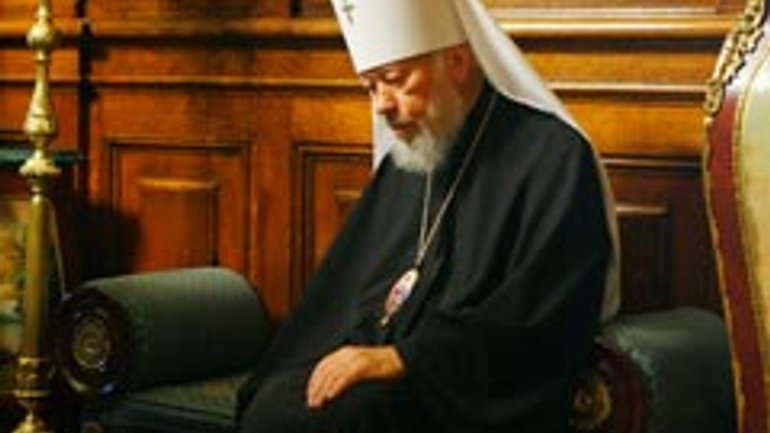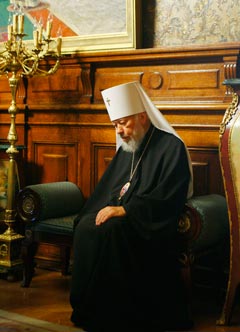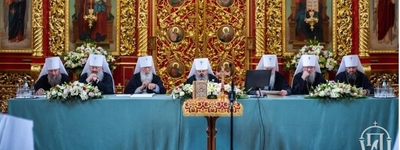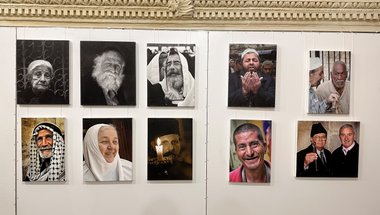What happens after Metropolitan Volodymyr?


His management style can easily disappoint an outside observer: half-hearted decisions, inability to insist upon his own will, reprove his subordinates, shut up wild critics, say no to odious politicians, reject awards, refuse someone an award, act decisively, judge severely, etc.
He never did that. Therefore, in the eyes of people, who are used to view leaders as “managers,” as calculating, authoritative, tough people aiming at tangible and, if maximally quick success, he looks a “weak” leader. Sometimes they say that Metropolitan Volodymyr is a king played by his entourage. That everything is decided by his entourage. Soon after he became the Metropolitan of Kyiv, he was surrounded by Ukrainophobic people, and the policy of UOC was clearly “pro-Moscow.” Then the situation changed, young ukrainophile “upstarts” appeared in his entourage and the policy of UOC became “pro-Ukrainian.”
But is it not strange? “A “politically weak” head who is not capable either of a strong intrigue or authoritative actions, proves to be a man who guarantees the integrity of the Church which is torn apart by contradictions. He is not a spineless monarch who is easily manipulated by his entourage and therefore fits everyone. Metropolitan Volodymyr is the point of equilibrium in UOC. For UOC has more radicals and radicalism than for example in UOC-KP, even though it may sound very strange to an unprepared person.
Anyway, the habit to describe Metropolitan Volodymyr as a “weak” leader is hardly grounded taking into account the fact that he successfully fulfilled all the tasks set for him. It is hard to say now what his opponents mean when they in turns accuse him either of being russophobic or ukrainophobic: the “interests of Ukraine” can be viewed differently even by the same person at different times. But one thing can be said for sure: Blessed Metropolitan Volodymyr of Kyiv hardly acted against the interests of the Ukrainian Orthodox Church at any stage of his activity.
Even though he assumed the authority over UOC at the time, which was uncertain for the Ukrainian Church, Metropolitan Volodymyr fulfilled the program with which he came to Kyiv: he has preserved the integrity of UOC. Moreover, one can hardly doubt the role played by him to establish the Church peace. And to start making attempts to settle the problem of Church schism peacefully in a very short period for the Church, which is used to think in terms of eternity.
Now, the memory of the days when Metropolitan Volodymyr assumed the authority over UOC is somewhat forgotten. But one can still remember some things. I think, the participants of the Kharkiv Council exaggerate a little when they describe their fear of possible arrests, pogroms, etc. But the situation was really quite tense. The leadership of the state did not feel awkward to (as it did not ever feel awkward in the past and unfortunately does not feel so now) to pressurize church ministers of all levels in order to ensure support of “their” Church. The national sentiments were also on the rise among the ministers and parishioners, and the positions automatically inclined towards the “national” Church.
However, UOC was preserved and in the course of time, gained authority not as the “Moscow” but as Ukrainians’ “own” Church. The Moscow colleagues try to view it as a confirmation that “Ukrainians aspire for unity with the Russian Church.” But they just interpret other people’s success as their own in doing so. UOC led by Metropolitan Volodymyr has become Ukrainian not nominally but in essence without being forced, without multiplying schisms, without becoming a proud recluse but keeping the connection with the mother Church and Ecumenical Orthodoxy. People who are close to the Church know how dear it costs.
That “unity” remains quite a painful subject, a cause for speculations both on the Russian and Ukrainian part. Unpreparedness either to unambiguously accept and recognize itself a “part of ROC” or finally break with it disappoints those who are used to view the Church as a part of the great politics. But the Church is more than the politics.
The position of UOC as a young autonomy is quite complicated. This autonomy has not been finally accepted even within itself. Not to mention the inertia of the Ecumenical Orthodoxy, which is struggling to get over the shocks connected with Church remapping after the collapse of the Soviet Union. In this situation, it is important to keep the connection of the Ukrainian Orthodoxy with the Ecumenical Orthodoxy and to remain its part. ROC is the most obvious way to ensure that connection. Obvious but not the only one.
Ecumenical Patriarch Bartholomew until recently took active part in the Ukrainian affairs. It did not cause any active opposition on the part of the Kyivan Metropolitanate: Metropolitan of Kyiv himself repeatedly mentioned in his addresses the kin relations between Kyiv and Constantinople. They even considered a scenario of entrance of the Ecumenical Patriarchate in the territory of Ukraine and parallel existence of two Ukrainian Orthodox jurisdictions under the umbrella of Metropolitan Volodymyr. His “authority primacy” was undoubted and there were hopes that in that format, the Ukrainian Church will finally gain the needed unity. But that scenario proved too risky for ROC and too ideal for Ukraine. However, the favourable attitude of Metropolitan Volodymyr to that idea quite clearly characterizes the position of the head of UOC.
There is no surprise that Metropolitan Volodymyr was labeled as “russophobic” by the radical supporters of the idea of the “Russian unity.” Bad fate after the election of Patriarch Kirill was foretold for him. However, the latter has not dared yet to dismiss Metropolitan Volodymyr from the leadership of UOC. Almost every his visit to Ukraine is accompanied with such fears. The present visit is not an exception. They even describe future scenarios of various degrees of drama, according to which Metropolitan Ilarion or Metropolitan Irinei will become the new metropolitan or direct patriarchal government will be introduced after some scandals as a “temporary measure” (what can be more permanent than something temporary?).
But it has not happened so far. And will most probably not happen now. No matter how good the mentioned scenarios may be, none of them is timely.
The question is how exactly the “timeliness” is viewed by ROC. It is probably not easier for “managers” than for ordinary TV viewers to understand a “man of prayer.” They probably also wonder why he still “has not stopped,” “has not reproved,” etc. But to challenge the authority of Metropolitan Volodymyr openly ROC does not dare so far.
After the election of the “right Orthodox president” there is no such urgent necessity of refine ideological methods of keeping Ukraine within the orbit of Russia. Political will of the top leaders of the country is enough now. And Patriarch of Moscow speak to them without mediators. At least, there is no doubt that Ukraine’s President is in the patriarch’s pocket. Even more so than in the Kremlin’s pocket. All this makes observers fear for the fate of UOC, for its metropolitan and the very autonomy. The status of a self-governed church can become a mere formality in UOC with the coming of the new head. It can even be annulled “in answer to numerous requests” and “as it has lost actuality.”
One can really do to a status whatever one wishes. But how to influence people’s minds? The figure of Metropolitan of Kyiv may irritate Moscow exactly by the fact that it influences the minds. When Patriarch Kirill comes to Ukraine he demonstrates “who is the boss” not only because he is expected to do so by Moscow. But also because he himself needs it. He knows anyway that the authority of Metropolitan Volodymyr in Ukraine is not inferior to that of Patriarch of Moscow. At least, not inferior. This naturally irritates an authoritative leader. As well as the “voltairianism” of the Kiyiv leadership, which flirts with the national idea, nurses the “specificities” and “originality” of the Ukrainian Church, whereas the Patriarch of Moscow himself preaches “the wonderful new Russian world.”
Will ROC be determined enough to dismiss the only person guaranteeing the fragile peace in the Ukrainian Church? Only if peace is not part of their plan, perhaps. Or, maybe, they think that “ukrainophiles” in UOC are a bunch of adventurers manipulating the head, and that as soon as they stamp their feet on them, the (Russian?) peace will reign in UOC and , maybe, in the whole galaxy. As long as UOC remains Ukrainian by shape and content, it will be native also in the regions of Ukraine where the “Russian Church” together with the idea of the “Russian peace” will never be popular. For this reason alone, to keep at least the appearances of control over Ukraine, the leadership of ROC will have to tolerate the autonomy of UOC, promote the preservation of its integrity and even tolerate the Ukrainian language of Divine Services and other expressions of “originality.”
Recently, much has been written about what happens “after Volodymyr,” who will become the new head, what scenario is going to be used, what policy will be applied by the successor, etc. And illegitimately little is said and written about what will NOT happen. Will not happen because during the twenty years of the headship of Metropolitan Volodymyr, we have received, learnt, understood something and will be able to keep it and defend it if need be. We will not believe that only the intrigue and politics rules the Church. That the Church can be reduced to the department of ideology. For we witnessed a “weak” leader nearly alone resisting powerful forces shaking the Church from the outside and from the inside. We witnessed wisdom gradually overcoming ideological narrow-mindedness. We witnessed love overcoming estrangement. In the course of time, the chaff of the “historic circumstances” will fade away. No one will remember who Metropolitan Volodymyr awarded and with what awards, who awarded him and for what, which politicians and oligarchs were received in his residence and with whom he dined. The history will retain at least twenty years during which the Ukrainian Church arose, grew up and gained strength under his non-managerial headship but thanks to his prayers.











